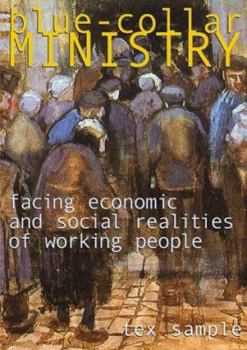Blue-Collar Ministry: Facing Economic and Social Realities of Working People
How is the church ministering to the needs of men and women who work on assembly lines and in machine shops? Not always very effectively, concludes Sample, who draws his deep understanding of the... This description may be from another edition of this product.
Format:Paperback
Language:English
ISBN:0817010297
ISBN13:9780817010294
Release Date:June 1984
Publisher:Judson Press
Length:192 Pages
Weight:0.60 lbs.
Dimensions:0.5" x 5.5" x 8.5"
Customer Reviews
2 ratings
Recommended by Micah Sifry, Final Review--McCain Benefits
Published by Thriftbooks.com User , 16 years ago
Micah Sifry in Spoiling for a Fight: Third-Party Politics in America recommends this book. This book is a seminal reference, a vital, urgent reading for anyone who wishes to do the right thing for our massive blue collar population that has been betrayed by both parties (see Running on Empty: How the Democratic and Republican Parties Are Bankrupting Our Future and What Americans Can Do About It. Here are highlights from my fly-leaf notes: + Our society has structured inequality built in at all levels, and the blue collar and working poor populations will NEVER climb out of their pit unless we minister to them in an active manner. + The focus of the blue collar worker is the neighborhood, and a web of favors given and received, favors that define not just a community, but a covenant of community. See Off the Books for more on this. + Our "culture" has managed to make every individual that is structurally repressed feel guilty for not being able to rise above their circumstances because our churches and our state preach freedom of opportunity, but the REALITY is that the upper class web of connections trumps lower class striving every time. + The deindustrialization and deskilling of the economy (Bill Clinton's signal mistake, apart from being inept at getting single-payer health care where the working class would be the principal beneficiary) has deepened the disadvantages of race and gender in America. + The author does a superb job--truly a scholarly and responsible job--of properly reviewing applicable literatures and offering proper citation in text, not just endnotes, of a rich buffet of practical and intellectual contributions by others. + He discusses five types of blue collar groups: - Blue Collar Winners, a threatened species - Blue Collar Respectables, want family, school, and church to be in harmony, conformists, a morality of repression, lowered social norms make it harder to be "respectable," and there is no social mobility - Blue Collar Survivors, trapped like inmates, a daily struggle to stay even with life in the face of multiple challenges - Blue Collar Hard Living, heavy drinking, marital instability, toughness, political alienation, rootlessness, present time orientation, strong sense of individualism The author's greatest contribution is his full exploration of how a pastor in a blue collar neighborhood cannot think of themselves as being on the pinnacle of a pyramidal organization between the community and God, but rather as a member at the base, part of a web of giving and love, dignity and local empowerment. This book should be required reading for EVERY pastor of ANY faith. It should also be required reading for every Precinct Captain for any political party, ideally a third party such as the Libertarians or Greens. This book is a handbook for connecting, empowering, and enriching at the local level. The author concludes that the "ward heeler" is the best model, an individual that is constantly moving th
"Blue-collar people are not abstractions . . ."
Published by Thriftbooks.com User , 24 years ago
If the church is to develop a relevant ministry, it must have an understanding of and an appreciation for blue-collar life-styles, the conditions that shape these life-styles, and the need to survive class bias which causes inequities of opportunity. Sample brushes aside the stereotyped caricatures so often associated with factory workers, to present a realistic picture of the winners, losers, and survivors. His study challenges churches to develop a sensitive response to blue-collar needs-one that will bridge the gap between societal achievement myths and blue-collar realities by proclaiming that all persons through God's love are of infinite worth apart from who they are and what they do for a living. Sample describes many opportunities for relevant blue-collar ministry through worship that truly reflects the working experience, church programming that promotes close bonds of belonging, and community organization to cope effectively with inequities of opportunity. Pastors will be especially helped in their ministries by the suggestions for gaining acceptance in the blue-collar culture through an understanding of reciprocal relationships and in-depth knowledge of the community.





